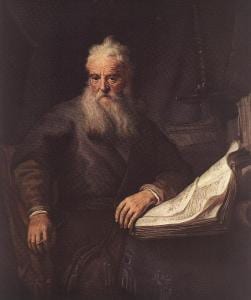 Even though I am writing this on Good Friday, April 10, the Narrative Lectionary sets the famous 1 Cor.13 text for the sixth Sunday of Easter. Yet, as I thought about this wonderful text, and as I continued to shelter in place along with well over 300,000,000 of my fellow Americans—an astonishing and heartening number indeed—I could hardly imagine a more important bit of Scripture for all of us right now. Paul’s deep reflection on God’s unbreakable love for us is something we desperately need at this time when the microbial beast of COVID-19 continues to stalk the earth. The Beatles’ claim “all you need is love” is perhaps both overly maudlin and at least generally true. And its truth is to be found in all three of the world’s major religious traditions, as I hope to show.
Even though I am writing this on Good Friday, April 10, the Narrative Lectionary sets the famous 1 Cor.13 text for the sixth Sunday of Easter. Yet, as I thought about this wonderful text, and as I continued to shelter in place along with well over 300,000,000 of my fellow Americans—an astonishing and heartening number indeed—I could hardly imagine a more important bit of Scripture for all of us right now. Paul’s deep reflection on God’s unbreakable love for us is something we desperately need at this time when the microbial beast of COVID-19 continues to stalk the earth. The Beatles’ claim “all you need is love” is perhaps both overly maudlin and at least generally true. And its truth is to be found in all three of the world’s major religious traditions, as I hope to show.
The central belief of Christianity is that God is love, and because that is so, we are called by that loving God to love one another. And by the “other,” we do not merely mean other humans, but also all of God’s creations, animal and plant, too. The Greek word that Paul uses to name this divine love is agape. It is quite true that this word is regularly used in the New Testament to speak of God’s unique love for the creation, though it is equally true that too often it has been too sharply contrasted with another Greek word for love, eros. There was a time in the study of the Bible that the first word was said to be exclusively the love of God, while the second was exclusively human, passionate love, hence the English derivative “erotic.” Any more serious study of the use of these words in the Bible’s literature demonstrates that such a sharp distinction simply cannot be sustained. It should more accurately be stated that eros arises from the feeling of incompleteness, a longing of the lower for the higher, while agape may be described as a binding of the perfect to the imperfect, a kind of condescension of the higher to the lower (see Paul’s letter to the Philippians, chapter 2, as example). Yet, eros’ concern of longing cannot be fully eliminated from agape. God’s love for Israel contains elements of desire, just as in the New Testament the only true fulfillment of human eros can be found in God who is agape.
Thus, when Paul announces unforgettably that “the greatest of these is love” (agape), he surely implies that human love, eros, is ultimately completed in God’s unbreakable love, agape. Humans reach out in love, because God reaches down in love for all. The ubiquitous use of the Corinthian passage at weddings is thus not at all wrong, however much the couple may only have a limited view of eros as human love in their minds, rather than the all-encompassing love of God that makes all eros possible. So, when the Beatles sing their famous line, they are indeed correct in the Christian sense if their word “love” includes within it the full range of the meanings of eros and agape.
I also suggest that a similar notion is to be discovered in the Hebrew Bible; in fact I must say that the complex interweaving of human and divine love that Paul proclaims in 1 Corinthians derives directly from Paul’s Jewish background. Any erroneous idea that we find in the Hebrew Bible only a sort of “work’s righteousness,” where one only earns God’s love by obeying God, is completely false, however often that cliché has been uttered in Christian churches over the centuries. In the Hebrew Bible the love of YHWH is preeminent and precedes any attempts at human love. This may be seen in numerous places, but let me choose one classic example to make the point.
The 8th century BCE prophet Hosea became convinced that YHWH had called him to marry a prostitute as a sign that YHWH loved people, as well as all created things, no matter what evil the humans beings got up to (Hosea 4:1-3). Hosea proceeded to wed Gomer, and very soon the blushing bride went back to her trade of prostitution. But Hosea refused to give up on her, and went after her again and again in the attempt to make her truly his spouse. So it is with God, he said. YHWH will never give up on us. The prophet clarifies his idea in his fabulous chapter 11. Israel has done many things worthy of YHWH’s anger, as Hosea recognizes with blazing poetry chapter after chapter, even beginning chapter 11 with the charge that the people “kept sacrificing to the Baals, and offering incense to idols” (Hosea 11:2). Then in vss.5-7 he speaks as many of his fellow prophets do, warning of divine devastation due to their refusal to follow the ways of YHWH. But then, in a dramatic shift of tone, Hosea has YHWH cry out in pain and anguish.
How can I give you up, Ephraim?
How can I hand you over, Israel?
How can I make you like Admah?
How can I treat you like Zeboiim? (The latter two cities are connected with Sodom and Gemorrah)
My heart turns upside down within;
my compassion grows warm and tender.
I will not execute my fierce anger;
I will not again destroy Ephraim,
for I am God, not a male human,
the Holy One in your midst (Hosea 11:8-9)
YHWH’s love overcomes YHWH’s anger at the shortcomings of the people. The key word is “compassion”. This word is derived from the Hebrew word for “womb” (rechum). As the author of Hosea cast about for the best way to describe the astonishing love of YHWH, he lighted on the way that a mother cares for and longs for her unborn child. Like that mother, he says, so is YHWH’s love for us. “And the greatest of these is love,” says Paul, and that idea came straight from his Judaism.
This idea of divine love is also the central claim of Islam. Mohammed grew up around large Jewish and Christian communities in his birth city of Mecca in 571CE, and thus was well aware of both the Jewish and Christian traditions of the unbreakable love of God. It is hardly an accident that every sura of the Qur’an, that is, every chapter begins with the same words: “In the name of Allah, the all-merciful, the all-compassionate.” The two descriptive words in Arabic are rahman and raheem, both of which are derived from the Arabic word for womb, precisely as the prophet Hosea employed the term. Thus, the love of Allah is as the love of YHWH is as the love of God in Jesus. Elsewhere in the Qur’an we read “My rahma has encompassed everything” (Qur’an 7:157), suggesting that Allah provides provision for everyone, believer and unbeliever alike. Of course, as in the Bible, such notions are ideals about God, and are unfortunately not always indicative of the ways the supposed followers of God/Allah comport themselves in their lives. Still the central idea about God/Allah in all three traditions is a womb-like love that simply cannot be lost, broken, or overcome.
Those of us who remain committed to one of the three great traditions of religion in our time need always to hear about this love of God. But especially now in a time of enforced separation and isolation, God’s love, YHWH’s love, Allah’s love remain always with us and is the source of our abilities to ride this terrible virus out, to find strength in our possible sickness, and to face our possible death with the certainty that the love of God will never leave us. That certainty is ours now and always.
(Images from Wikimedia Commons)











